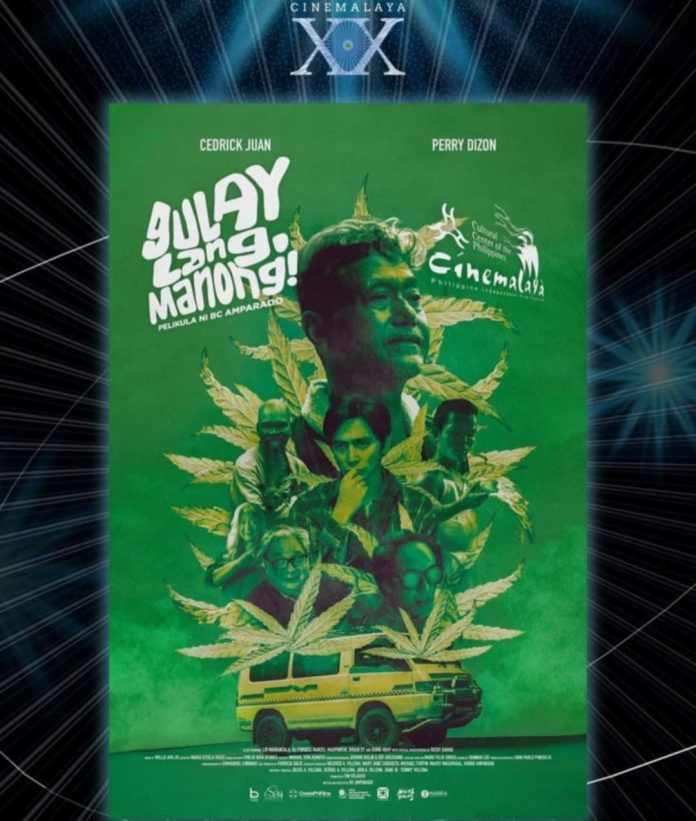“Legalize medical marijuana!”
The chant reverberated during the gala screening of “Gulay lang Manong” by Director BC Amparado as one of the entries in the main full length film competition of this year’s Cinemalaya Independent Film Festival,
Pilo (Perry Dizon) is a struggling, old vegetable farmer in Benguet. His stoner brother, Ricky( BJ Tolits Forbes) , is part of the prominent Benguet Marijuana Cartel and is being trained by his best friend, Razer (Ranzel) a cunning midget and a well known personality in the underground Ganja community.
Amidst the all out drug war, Ricky falls into the hands of a promising patrolman, Ariel (Cedric Juan), who is in pursuit of the organization. In a desperate attempt to uncover the cartel, Ariel tasks Pilo to fetch Razer in exchange for Ricky’s head.
Unable to fulfill the terms in his attempt, Pilo now pledges his alliance with Ariel, and together they try and catch Razer to expose the Cartel and its members learning shocking secrets as they burrow deep into the drug world.
Juan said that the film is meant to challenge the viewer’s “moral compass” when it comes to the topic of “marijuana,” and how they can learn from it.
“It is about the wrong beliefs when it comes to cannabis which is leading towards the dark side. You can learn about this topic, which could lead to more people being open,” Juan said in an interview.
Director BC Amparado said that the film aims to humanize the discourse around medical cannabis and to educate the audience about the potential that it brings as an effective alternative medicine and as an economic asset that benefits our local farmers.
He added that the goal is to break the stigma and misunderstanding around medical cannabis in the Philippines. “This is not only a story about a plant but a narrative on resilience and the pursuit of a new medical hope for individuals in need.”
Musician Dong Abay, a colleague from the University of the Philippines, is a known advocate of legalization of medical marijuana. He portrays a weed guru in the film.
The negative image of marijuana has increased exponentially during the anti-narcotics campaign during the term of former president Rodrigo Duterte. His war on drugs has been marred by extrajudicial killings (EJK) with reported staged crime scenes where police allegedly execute unarmed drug suspects and plant guns and drugs as evidence.
Senate Bill (SB) No. 2573 or the Cannabis Medicalization Act of the Philippines is pending before the Senate.
Under the measure, the use of cannabis for medical purposes will be allowed “to treat or alleviate a qualified patient’s debilitating medical condition or symptoms.”
The medicalization of cannabis will include its acquisition, possession, transportation, delivery, dispensing, administration, cultivation, or manufacturing by private individuals or entities only for medical and research purposes.
Medical marijuana comes from the Cannabis sativa plant that is used to ease symptoms caused by certain medical conditions. Medical marijuana also is called medical cannabis.
Cannabis sativa has chemicals called active compounds. They act in the body in ways that may ease certain symptoms. The best known are delta-9 tetrahydrocannabinol (THC) and cannabidiol (CBD). THC is the part of marijuana that acts on the brain and affects mood, behavior and thoughts, called psychoactive.
Advocates say that medical marijuana can be used to treat some medical condition that include: Alzheimer’s disease, Amyotrophic lateral sclerosis (ALS), HIV/AIDS., Crohn’s disease., Epilepsy and seizures., Glaucoma, Multiple sclerosis and muscle spasms, Posttraumatic stress disorder, Serious and ongoing pain, Serious nausea or vomiting caused by cancer treatment.
Forms of taking medical marijuana include: (a) inhaled that involves dried cannabis flower in a cigarette, pipe or vape device; (b) eaten that comes in capsules, chewable candies called gummies and baked goods; (c) put under the tongue or on the mucus membranes of the mouth as a liquid or spray; (d) rectally as a suppository that’s put into the rectum and ( e) topical which goes on the skin in the form of a lotion or gel.
Director BC Amparado said that the film is also a peek into the lives of local vegetable farmers and the struggles they deal with on a regular basis.
“This film will give importance to the power that our farmers have and how the agriculture industry is affected by politics, power, and exploitation. This is not a traditional advocacy, as it is designed to be a call for empathy and understanding,” Amparado said.
Juan encourages buying vegetables direct from farmers as part of a movement that emphasizes cutting out the middlemen in the food supply chain.
By purchasing directly from farmers, consumers have the opportunity to access fresher produce while supporting local agricultural communities. This practice involves a direct transaction between the consumer and the farmer.
(Peyups is the moniker of the University of the Philippines. Atty. Dennis R. Gorecho heads the Seafarers’ Division of the Sapalo Velez Bundang Bulilan Law Offices. For comments, e-mail info@sapalovelez.com, or call 09175025808 or 09088665786.)




